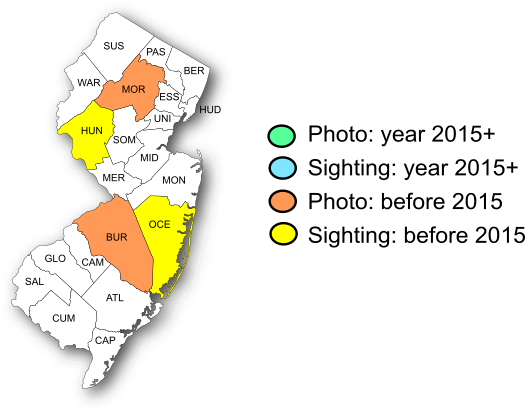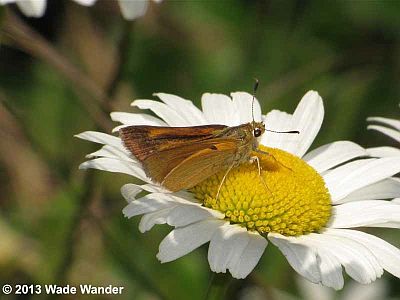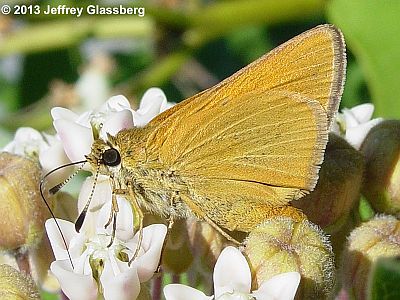New Jersey Butterfly Club
A chapter of the North American Butterfly Association (NABA)
Arogos Skipper
Atrytone arogos
Identification: Very small—FW ≥0.6". Sexes similar below. Above: Male FW orange with broad, blackish-brown trailing border. No stigma. HW has central orange patch with broad, blackish-brown borders. Female FW has smaller orange patch than male, with a dark, stigma-like line paralleling the leading edge. NOTE: Arogos Skippers rarely bask with wings open, so upperside is usually difficult to see. Below: Both wings are medium-orange, unmarked except for pale veins on HW, and have pale fringes. Similar skippers: Delaware Skipper is brighter orange below, lacks pale veins, and has orange fringes. Delawares often bask, displaying black veining on upper surfaces and extensive dark FW marks on female.
NJ Status and Distribution: Classified as Endangered in NJ. Resident. In NJ, formerly occurred as two distinct populations. The northern NJ population was confirmed only in Randolph/Roxbury Townships, Morris County, but no Arogos have been observed there since 2013. The Southern NJ population is apparently still extant on the Joint Base McGuire-Dix-Lakehurst military installations in Burlington and Ocean counties.

Habitat: Northern NJ population: Dry upland fields and powerline ROWs with Little Bluestem grass and nectar sources. Southern NJ population: Seasonally wet, savanna-like areas with Pine-Barren Sand-Reed, a species that may appear following wildfires.
Flight Period: Northern NJ population: Late June—mid-July. Extreme dates: 6/30—8/2. Southern NJ population: Late July—mid-August. Extreme dates: Unreported.
Caterpillar Food Plants: Northern NJ population: Little Bluestem grass (Schizachyrium scoparium). Southern NJ population: Pine-Barren Sand-Reed (Calamovilfa brevipilis).
Overwintering Stage: Caterpillar.
Good Locations: Known locations are not accessible to the public.
Comments: Reason(s) for the loss of the northern NJ population are unknown, as the habitat at the locations formerly occupied appears little changed from a human perspective. But numbers of most resident NJ skippers have declined noticeably, and when a population is extremely small to begin with it can easily wink out.

